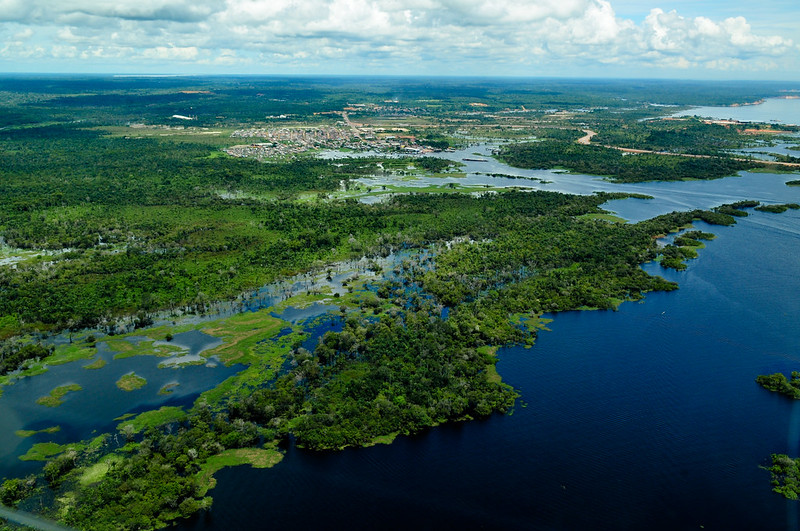Amazon Rainforest Reforestation
 Deforestation has significant environmental, social and economic impacts, so Amazon rainforest reforestation is important for many organizations. The Eden Projects works with local communities living in extreme poverty to revive and supervise land, providing employment opportunities and fair wages. Thus, it fosters economic opportunity and serves as a means for these communities to alleviate themselves from poverty.
Deforestation has significant environmental, social and economic impacts, so Amazon rainforest reforestation is important for many organizations. The Eden Projects works with local communities living in extreme poverty to revive and supervise land, providing employment opportunities and fair wages. Thus, it fosters economic opportunity and serves as a means for these communities to alleviate themselves from poverty.
What Is Deforestation?
Deforestation is “the decrease in forest areas across the world that are lost for other uses such as agricultural croplands, urbanization or mining activities.” Often, when land ownership systems are fragile in developing countries like Brazil, large corporations acquire the land and repurpose it for other activities – thus disrupting the lives of the local communities.
Forests sustain local communities and Indigenous people, providing them with food, medicine, shelter, building resources and even holding significant cultural importance. Due to deforestation, around 20% of the Amazon rainforest is razed, propelling many of these locals further into poverty, as they are losing their sustainable resources.
Causes and Effects of Deforestation
Agriculture is the main cause of deforestation, accounting for around 80%. Subsistence agriculture, where the food produced is mostly consumed by the farming family and not sold, contributes to 33% of this agricultural-driven deforestation. About 40% is from commercial agriculture, like soya plantations and livestock farming in Brazil. Infrastructure, such as roads, railways, dam-building, mining and logging, are other causes of deforestation.
Poverty is another cause of deforestation, as many local communities and Indigenous people are dependent on forests. When they are faced with a lack of income and poverty, they resort to clearing the forest for its resources or agriculture. While poverty can be a cause of deforestation, it is also an effect.
Locals whose survival hinges on forests, using them for hunting, gathering resources and for their own agriculture, end up having to choose between leaving or staying. Either way, they face repercussions. If they decide to go, they face the challenge of starting a new life and avoiding conflict by relinquishing their land. If they choose to stay, they can work for the corporations that subject them to deplorable working conditions and unfair wages.
Deforestation also causes soil erosion, which can increase the likelihood of floods and landslides. Soil erosion also reduces soil fertility, impacting food production and causing food insecurity as it is unsuitable for agricultural use.
Eden Projects
Eden Projects is a nonprofit organization that works with local communities and focuses on restoring landscapes in developing countries like Brazil, Kenya and the Philippines. The organization defines land restoration as “a holistic, standards-based approach to restoration and conservation that generates environmental, socioeconomic and biodiversity benefits for the well-being of communities and the planet.”
The Eden Projects has initiated a land restoration project to reforest the Amazon rainforest, Cerrado and coastal mangrove estuaries. The project was started in 2021 and involves collaborating with local communities and leaders to bring the rainforest back to life. The Eden Projects believes in building strong relationships with the local leaders and communities, as they share similar goals of creating a sustainable environment.
How Eden Is Helping
Planting trees helps to restore the 62 million hectares of lost forest in Brazil. Around 30,000 hectares of trees have been reforested by Eden in Brazil, with Amazon rainforest reforestation focusing on mangrove estuaries. Mangrove estuaries play a crucial role in serving as habitats for animals, stabilizing coastlines and diminishing erosion.
With 9.3 million Brazilians living in extreme poverty as of 2018, Eden is helping by creating economic opportunity with its reforestation aid. Eden’s Amazon rainforest reforestation creates employment opportunities for local communities and establishes livelihood opportunities for those facing extreme poverty.
The project hires locals to work on project sites and in nurseries at a fair wage. It also involves them in the maintenance and protection of recently planted areas to engage them in the care of the forests. Eden also allocates a percentage of species planted for sustainable community use, benefitting the locals who relied on the land before deforestation occurred.
Some socioeconomic benefits of the employment opportunities Eden provides include parents who cannot provide food for their families, being able to provide healthy meals, paying school fees and allowing their children to achieve an education. Further economic opportunities arise as microenterprises emerge in the communities.
Final Remark
The vicious cycle of deforestation and poverty perpetuates a harmful loop of environmental and socioeconomic challenges. Amazon rainforest reforestation initiatives represent a crucial step toward addressing the challenges of deforestation. These initiatives aim to address the factors that drive deforestation while also providing employment opportunities for local communities, alleviating them from the extreme poverty they face. These initiatives involve planting new trees, restoring and preserving biodiversity and fostering sustainable livelihoods.
– Isabella Green
Isabella is based in Aylesbury, UK and focuses on Good News for The Borgen Project.
Photo: Flickr
